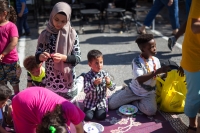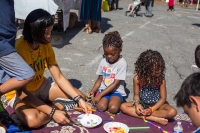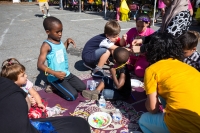Literacy, Language and Libraries for Refugees
Prince George's County Memorial Library System, Md.
Innovation Synopsis
Parkview Gardens is a 750-unit refugee resettlement complex. Prince George's County Memorial Library System offers a pop-up library in a model unit circulating materials, with a kindergarten through sixth grade mentoring/homework help program, English and technology lessons (using Rosetta Stone, tablets and laptops) for the mothers and ESL Storytime and arts for mothers and children.
Challenge/Opportunity
Female refugees do not have access to services that are critical to success. Women lack transportation, English language skills and face cultural barriers to accessing services. The under-performing school serving the refugee apartments has over 100 native languages represented among the students. School readiness is low due to the challenges faced by these families. The families also come to America with very few belongings and lack books in any language and digital devices.
Key Elements of Innovation
- ESL Storytime focuses on building blocks of critical day-to-day English language (numeracy, transportation, food, medical).
- Language and Technology – Children work on school readiness, fine and gross motor skills, colors and following directions. Concurrently, mothers work through English language lessons on laptops and tablets developing both tech and English skills.
- Kids Achieve Club offers homework help and mentoring for refugee children in grades K through sixth with materials in native languages and in graphic form.
Achieved Outcomes
The refugees participating in the program acquire English language and technology skills allowing them to better navigate and integrate into their new community. School-aged children are matched to a mentor who provides homework help, one-on-one attention and guidance on cultural issues. Young children develop the skills that determine kindergarten readiness. Participating families view the library as a safe place and trusted resource and are matched to community agencies as needed for further services.



